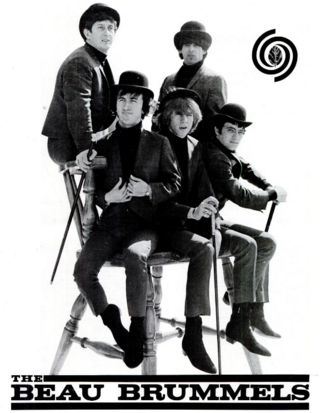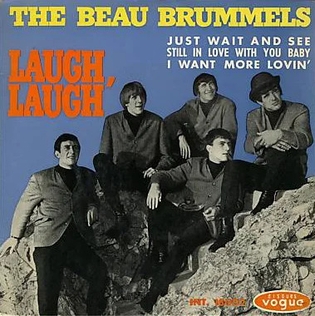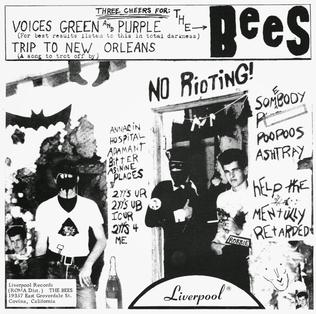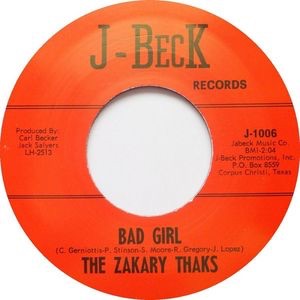Related Research Articles
Garage rock is a raw and energetic style of rock music that flourished in the mid-1960s, most notably in the United States and Canada, and has experienced a series of subsequent revivals. The style is characterized by basic chord structures played on electric guitars and other instruments, sometimes distorted through a fuzzbox, as well as often unsophisticated and occasionally aggressive lyrics and delivery. Its name derives from the perception that groups were often made up of young amateurs who rehearsed in the family garage, although many were professional.

Nuggets: Original Artyfacts from the First Psychedelic Era is a compilation album of American psychedelic and garage rock singles that were released during the mid-to-late 1960s. It was created by Lenny Kaye, who was a writer and clerk at the Village Oldies record shop in New York. He would later become the lead guitarist for the Patti Smith Group. Kaye produced Nuggets under the supervision of Elektra Records founder Jac Holzman. Kaye conceived the project as a series of roughly eight LP installments focusing on different US regions, but Elektra convinced him that one double album would be more commercially viable. It was released on LP by Elektra in 1972 with liner notes by Kaye that contained one of the first uses of the term "punk rock". It was reissued with a new cover design by Sire Records in 1976. In the 1980s, Rhino Records issued Nuggets in a series of fifteen installments, and in 1998 as a 4-cd box set.

Lenny Kaye is an American guitarist, composer, and writer, notable for his work with the Patti Smith Group, his contributions to music magazines, and his garage rock retrospective anthology Nuggets.

The Beau Brummels were an American rock band. Formed in San Francisco in 1964, the band's original lineup included Sal Valentino, Ron Elliott, Ron Meagher, Declan Mulligan, and John Petersen (drums). They were discovered by local disc jockeys who were looking to sign acts to their new label, Autumn Records, where Sylvester Stewart—later known as Sly Stone—produced the group's early recording sessions. Initially, the band's musical style blended beat music and folk music and typically drew comparisons to the Beatles, while their later work incorporated other music genres such as psychedelic rock and country rock.

"Dirty Water" is a song by the American rock band The Standells, written by their producer Ed Cobb. The song is a mock paean to the city of Boston, Massachusetts, and its then-famously polluted Boston Harbor and Charles River.

"Hey Joe" is an American song from the 1960s that has become a rock standard and has been performed in many musical styles by hundreds of different artists. The lyrics tell of a man who is on the run and planning to head to Mexico after shooting his unfaithful wife. In 1962, Billy Roberts registered "Hey Joe" for copyright in the United States.
The Barbarians was an American garage rock band formed in Cape Cod, Massachusetts, that was active from 1964 to 1967. They are known for their 1965 hit song "Are You a Boy or Are You a Girl", and their album of the same name.
The Choir was a garage rock band largely active in the greater Cleveland area from the mid-1960s into the early 1970s. Originally called The Mods, their largest commercial success came with the release of their first single "It's Cold Outside" in December 1966. The song, considered to be a classic of the garage rock era, was featured on Pebbles, Volume 2, one of the earlier garage rock compilation LPs. The flipside, "I'm Going Home" was included as a bonus track when the Pebbles album was reissued as a CD, and it can also be found on a garage rock compilation LP on Ohio bands, Highs in the Mid-Sixties, Volume 9. The Choir is well known for containing three of the four original members of Raspberries.

Pebbles is a compilation of US underground and garage single record releases from the mid- to late-1960s. It had a limited original release in 1978 and a more general release in 1979. It was followed by several subsequent Pebbles compilations and albums. This album is nowadays known as Pebbles, Volume 1 and was originally issued in 1978 as Pebbles, Volume One: Artyfacts from the First Punk Era, an obvious riff on Nuggets: Original Artyfacts from the First Psychedelic Era, a similar, groundbreaking compilation from 1972.
Mouse and the Traps was the name of an American garage rock band from Tyler, Texas, United States, that released numerous singles between 1965 and 1969, two of which, "A Public Execution" and "Sometimes You Just Can't Win", became large regional hits. The leader of the band, nicknamed "Mouse", was Ronny Weiss. Two of their best known songs, "A Public Execution" and a cover of "Psychotic Reaction", are not actually credited to this band but, respectively, to simply Mouse and Positively 13 O'Clock instead. Their tangled history also included one single that was released anonymously under the name Chris St. John. The band are not to be confused with the girl group Mousie and The Traps who recorded for Toddlin' Town records around the same time.

"Laugh, Laugh" is a song by American rock group the Beau Brummels, written by guitarist Ron Elliott and produced by Sylvester Stewart, later known as Sly Stone. Released in December 1964 as the band's debut single, the song reached number 15 on the U.S. Billboard Hot 100 chart the following February. "Laugh, Laugh" was the first hit single to come out of the emerging San Francisco music scene in response to the British Invasion. The song was later included on the band's first full-length album, Introducing the Beau Brummels, released in April 1965.

We the People was an American garage rock band from Orlando, Florida, that was formed in late 1965 and professionally active between 1966 and 1970. Although none of their singles charted nationally in the U.S., a number of them did reach the Top 10 of the local Orlando charts. The band are perhaps best remembered for their song "Mirror of Your Mind", which reached the Top 10 in a number of regional singles charts across the U.S. during 1966. The song has subsequently been included on several compilation albums over the years.

"Can't Seem to Make You Mine" is a song by American rock group the Seeds, written by vocalist Sky Saxon and produced by Marcus Tybalt. It was released as a single in 1965 and re-issued in 1967, when it peaked at number 41 on the U.S. Billboard Hot 100 chart, and number 33 in Canada.
Wimple Winch was an English psychedelic pop band that evolved from the group, Just Four Men. Originally a Merseybeat act, their individualized sound was personalized by their intricate vocal harmonies and exploratory lyrics.
"Moulty" is a song by the American band The Barbarians, and was released in 1966 on Laurie Records. It was written by Doug Morris, Barbara Baer, Eliot Greenberg, and Robert Schwartz, and was also produced by Morris. The lyrics refer to drummer Victor "Moulty" Moulton's loss of his left hand, and the feelings of estrangement that followed. The song was released as a single, and gave The Barbarians their second and final hit on the Billboard Hot 100.

"Voices Green and Purple" is a song by the Bees, an American garage rock and psychedelic band from Covina, California who were active in the mid-1960s. It has been mentioned as an innovative example of early proto-punk and has become highly prized by various garage rock collectors and enthusiasts.

"A Public Execution" is a song performed and recorded by the American band Mouse and the Traps, also credited simply as Mouse, written by Ronny "Mouse" Weiss (né Ronald Lon Weiss; born 1942) (music) and Knox Henderson (né Knox Holmes Henderson; 1939–2002) (words), and first released as the group's debut single on Fraternity Records in December 1965. The song was a big regional hit in Texas and peaked in the lower reaches of the Billboard charts, but has become better-known today, in large part, due to the band's uncanny imitation of Highway 61 Revisited-era Bob Dylan.

"Bad Girl" is a song by the American garage rock band the Zakary Thaks, written by the whole group—Chris Gerniottis, Pete Stinson, Stan Moore, Rex Gregory, and John Lopez—and was first released for the band's debut single on J-Beck Records in July 1966. The song was an immensely successful regional hit in Texas, precipitating "Bad Girl"'s national release on Mercury Records later in the year. Since its initial distribution, the tune has received further recognition for its appearance on several compilation albums.
"Farmer John" is a song written by Don "Sugarcane" Harris and Dewey Terry, and first recorded by the two as the American R&B duo Don and Dewey, in 1959. Although the original version of the composition did not receive much attention, it was reinvigorated by the garage rock band the Premiers, whose raving remake of the song was released in 1964. The song's raw and partying atmosphere was immensely popular, reaching number 19 on the Billboard Hot 100. Following the group's national success, several additional interpretations of "Farmer John" were released, making the tune a classic of garage rock.

The Underdogs were an American garage rock band from Grosse Pointe, Michigan who were active in the 1960s. They became a regular attraction at the Hideout, a club that was an early venue for acts such as Bob Seger, Glenn Frey, and The Pleasure Seekers, featuring Suzi Quatro, and it also served as the home to the Hideout record label, which released several of the Underdogs' singles. The group enjoyed success in the region and came close to breaking nationally with two records released through a joint deal on Reprise Records and then their last on Motown. The Underdogs' work has been included on various garage rock compilations such as the 1998 Nuggets 4-CD box set released on Rhino Records.
References
- ↑ "The Barbarians". last.fm. Retrieved February 27, 2015.
- ↑ "BARBARIANS". badcatrecords.com. Retrieved February 27, 2015.
- ↑ Lindsay Planer. "Are You a Boy or Are You a Girl". allmusic.com. Retrieved February 27, 2015.
- ↑ James Reed. "Old Music:The Barbarians". boston.com. Retrieved February 27, 2015.
- ↑ "Billboard Charts". billboard.com. Retrieved February 27, 2015.
- ↑ Richie Unterberger. "Are You a Boy or Are You a Girl - Overview". allmusic.com. Retrieved February 27, 2015.